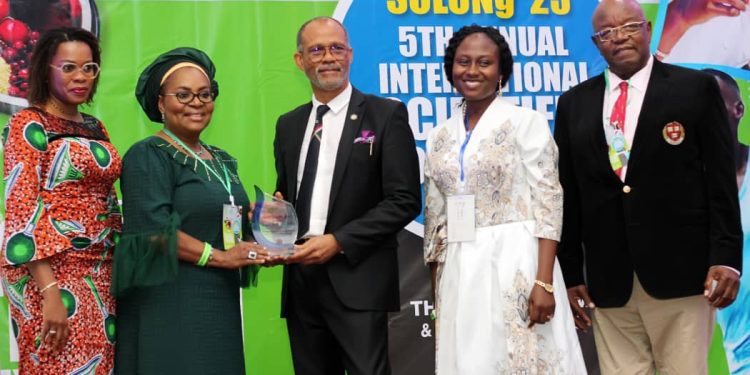The Society of Lifestyle Medicine of Nigeria (SOLONg) has taken a leading role in advocating for the increased integration of lifestyle medicine into healthcare practices across Nigeria and the broader African continent.
The integration of lifestyle medicine into healthcare system in Nigeria was the major highlight at the SOLONg’s 5th International Scientific Conference, themed “Healing Africa with Lifestyle Medicine: From Evidence to Action.”
The international conference which unfolded over two enlightening days in Lagos had in attendance distinguished guests, including the Lagos State’s First Lady, Dr. Ibijoke Sanwo-Olu, and the Lagos State Commissioner for Health, Professor Akin Abayomi.
The Lagos State Commissioner for Health, Prof Abayomi expressed a commitment to collaboration with SOLONg, emphasizing the importance of incorporating lifestyle medicine into the state’s medical facilities.
He stated, “I will engage you, and we should have a mutual exchange of ideas so that this lifestyle medicine that you have been promoting can be incorporated into the government’s register.”
The Lagos State’s first lady, Dr. Ibijoke SanwoOlu, acknowledging SOLONg’s commendable efforts in organizing the conference, stressed the need to involve stakeholders at the grassroots level for a better understanding of the importance of lifestyle healthcare.
She remarked, “I’m very impressed to be here. Apart from the healthcare leaders, I wish we had some of our grassroots people so that they can understand the importance of lifestyle healthcare.”

Dr. Moyosore Makinde, President of SOLONg, addressed the audience, highlighting the critical need to adopt evidence-based lifestyle healthcare to prevent and treat chronic health conditions.
Lifestyle medicine, she explained, is a specialty that utilizes evidence-based approaches to address lifestyle-related conditions, also known as non-communicable diseases.
Dr. Makinde outlined key pillars of lifestyle medicine, including a predominantly whole-food plant-based diet, regular physical activity, restorative sleep, avoidance of toxic substances, positive psychology, and stress management.
Dr. Makinde called for increased education among medical practitioners to ensure the adoption of lifestyle healthcare, a relatively new aspect of medicine, in their treatments and prescriptions. “Lifestyle medicine is a growing specialty worldwide, and awareness among medical practitioners can significantly improve health outcomes,” she added.
Dr. Abiodun Adelowo, Vice President of SOLONg, emphasized the urgency of incorporating lifestyle healthcare into the curriculum of higher learning institutions. He highlighted the rising prevalence of chronic diseases globally, such as hypertension, diabetes, and cancer, and stressed the need for a paradigm shift toward lifestyle interventions.
Dr. Mimi Osamwonyi, General Secretary of SOLONg, acknowledged the society’s infancy stage but noted significant progress following commitments from the state commissioner for health.
She highlighted the potential impact of decentralizing healthcare and incorporating lifestyle wellness clinics into different zones, a plan outlined by the Lagos State government.
The conference, encompassing various segments from panel discussions to fitness sessions, also delved into issues related to maintaining a healthy sleep, sex life, and other lifestyle healthcare topics.
SOLONg remains at the forefront of championing lifestyle medicine, aiming to usher in positive changes in healthcare practices across Nigeria.


